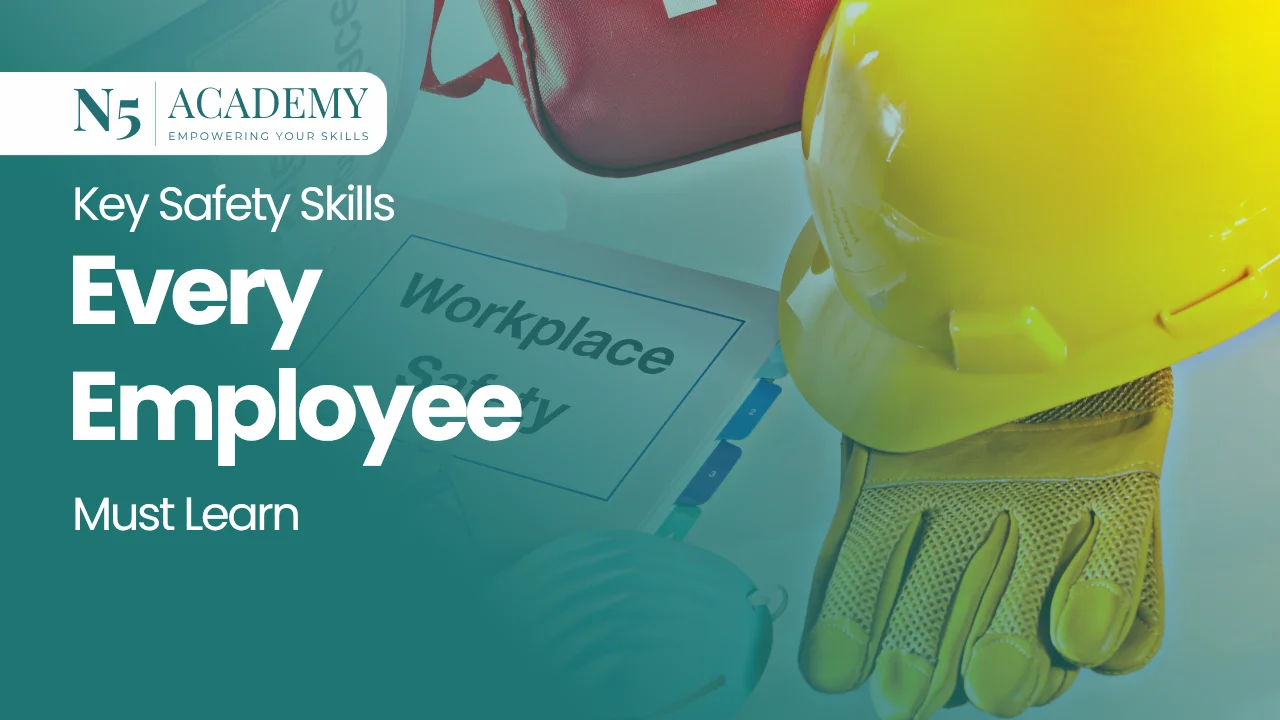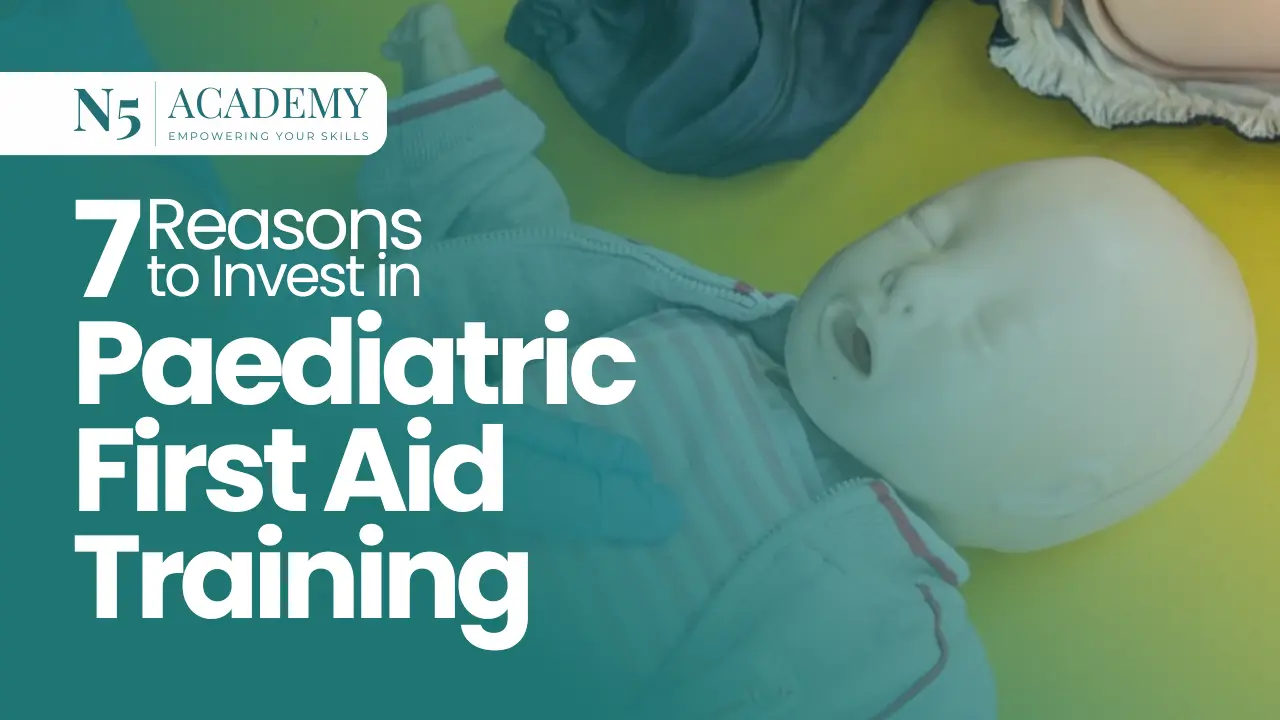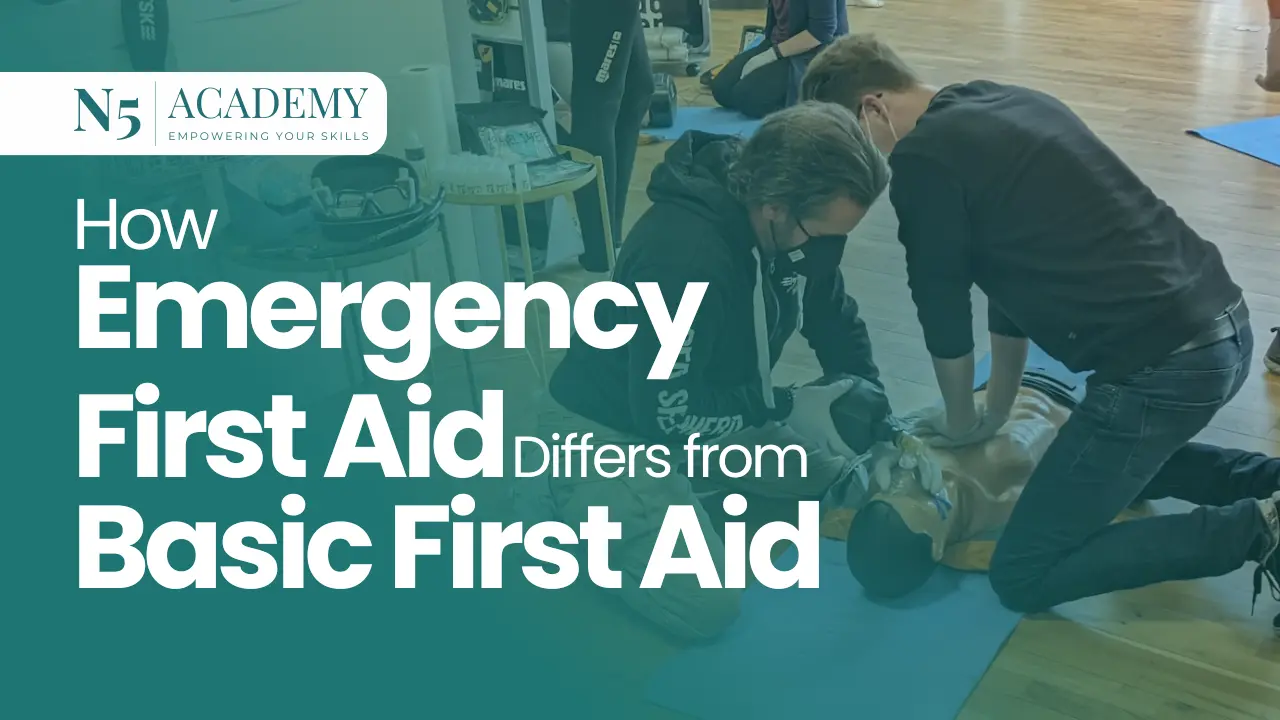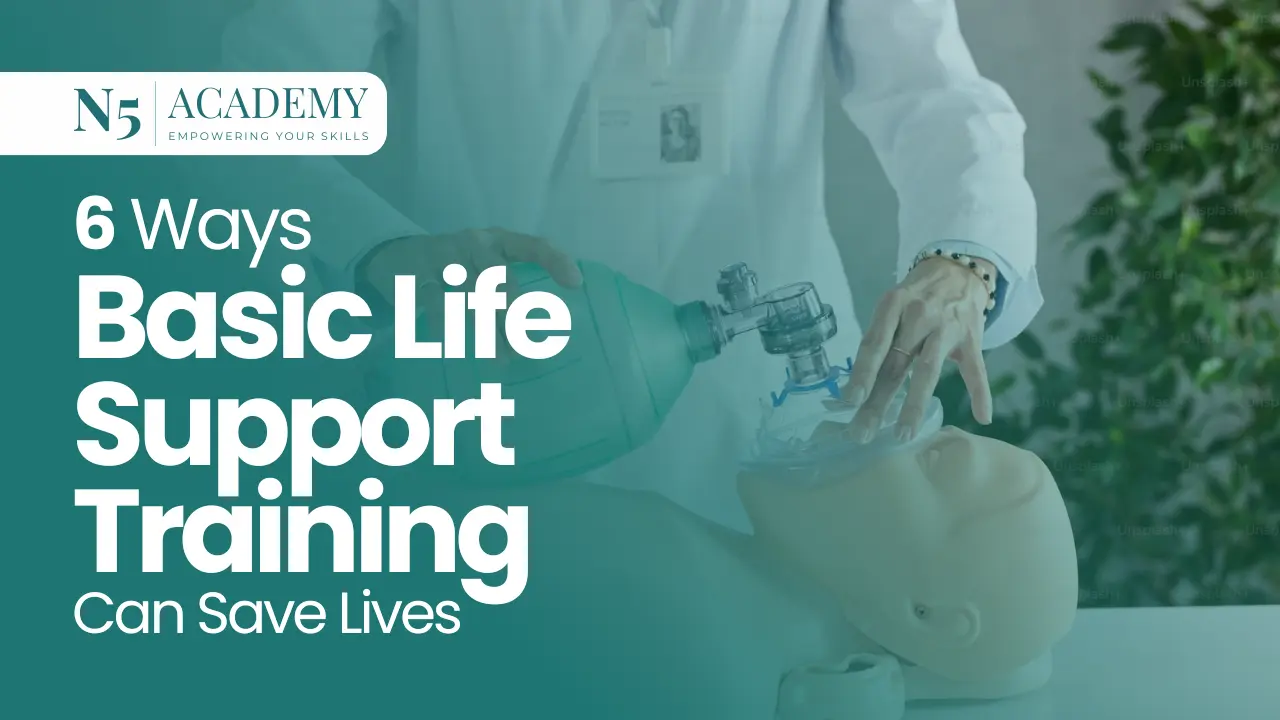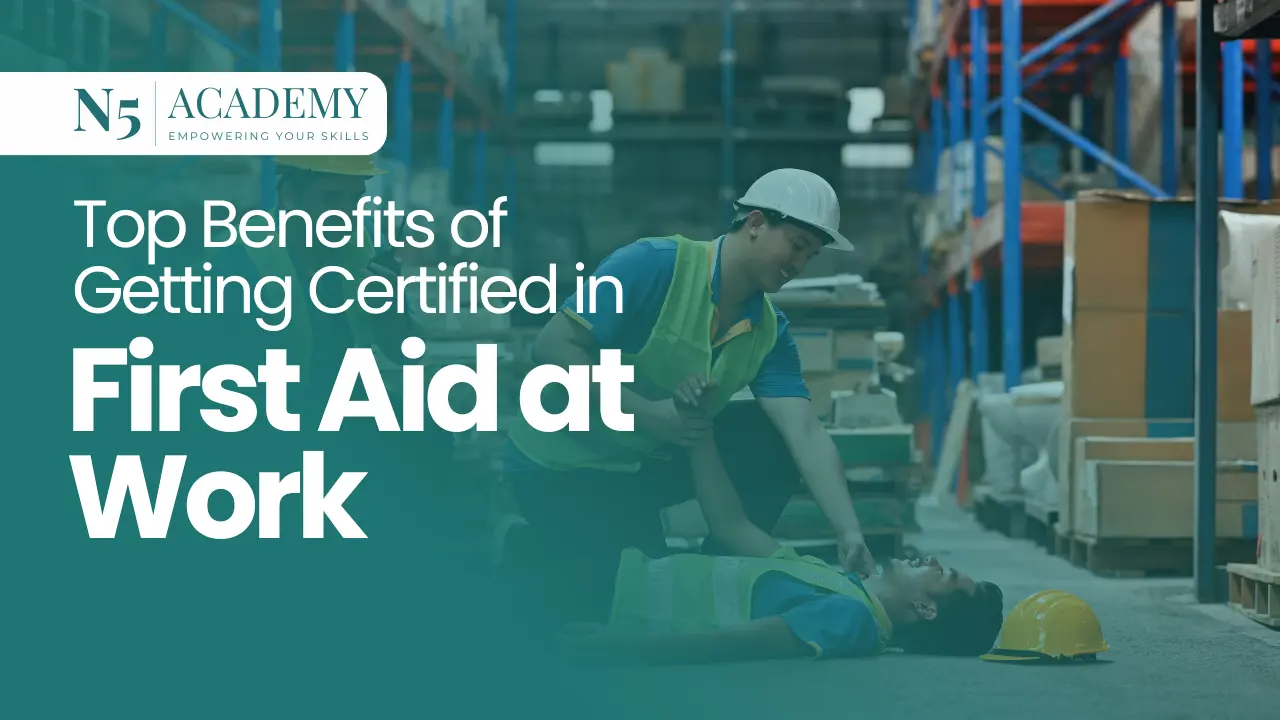Workplace safety is not just a legal duty; it is essential for a productive and supportive work environment. It affects the health and confidence of every employee. In the UK, thousands of workplace injuries happen each year, many of which could be avoided with better training and awareness. This shows the need to focus on safety education at all job levels.
Regardless of the industry, construction, hospitality, education, logistics, healthcare, or administration, knowing and applying basic safety rules is important. Whether you operate heavy machinery, handle hazardous materials, or work in an office, safety skills are essential. A well-informed employee can protect themselves and help keep others safe.
At N5 Academy, we believe every employee should have the knowledge and confidence to stay safe at work. Our mission is to provide high-quality training that helps individuals and businesses lower risks, prevent injuries, and create safer workplaces across the UK. We offer current, industry-standard courses for companies that prioritise safety and want to build a culture where everyone feels safe, prepared, and valued.
First Aid Knowledge: Be the First Responder
Accidents happen unexpectedly. A colleague might collapse, a machine could break, or someone might get hurt. In these situations, having a trained first aider nearby is crucial and can save lives.
Why It Matters:
- Basic first aid training helps employees feel confident to act quickly in emergencies.
- Quick responses can greatly improve recovery and even save lives.
- A well-trained staff relies less on outside medical help for minor injuries.
Core Skills Include:
- Learn how to perform CPR and use an AED.
- Take care of wounds, burns, and fractures.
- Identify emergencies like strokes and heart attacks.
- Handle allergic reactions, seizures, and shock.
- Prevent infections by practising good hygiene.
We provide customised First Aid Training and Emergency First Aid courses for different workplaces. This ensures your staff is prepared to respond when needed.
Fire Safety & Evacuation: Stay Calm, Stay Safe
Fires grow quickly. A small spark can turn into a big fire in seconds. Without training, panic and confusion can cause serious problems.
Why It Matters:
- Helps employees stay calm and act correctly during a fire.
- Speeds up evacuation and lowers the risk of injury or death.
- Reduces property damage with quick and smart actions.
Core Skills Include:
- Learn about different fire extinguishers and how to use them.
- Know the evacuation routes, assembly points, and alarm systems.
- Spot fire hazards and report unsafe conditions.
- Lead or help with fire drills and real evacuations.
Our FIRE MARSHAL AND FIRE SAFETY COURSE teaches your team how to handle fire emergencies. It helps them lead calmly during stressful times.
Manual Handling Techniques: Lift Smart, Not Hard
Lifting injuries are a major cause of long-term workplace injuries in the UK. These injuries can happen not just in warehouses or delivery teams, but also to office workers when they move supplies, chairs, or files.
Why It Matters:
- Prevents muscle and joint injuries and back pain.
- Boosts productivity by minimising time lost due to injuries.
- Encourages a safety-first culture that prioritises proper procedures.
Core Skills Include:
- Check for potential dangers before you lift or move anything.
- Lift with a straight back, bend your knees, and hold on tightly.
- Use tools like trolleys, pallet jacks, or hoists to help with heavy loads.
- Work together and communicate clearly when lifting with a team.
Our workplace safety training incorporates practical sessions that embed safe habits from day one.
Hazard Recognition: See It Before It Hurts You
The best way to stay safe is to prevent accidents. This begins with being aware of potential dangers. When employees can spot risks, they can fix problems before anyone is injured.
Why It Matters:
- Actively stops accidents, injuries, and health problems.
- Promotes employee responsibility for safety practises.
- Improves the workplace culture for reporting hazards.
Core Skills Include:
- Look for physical hazards like wet floors, bad lighting, and clutter.
- Identify chemical or electrical dangers.
- Know the risk levels and how to report issues.
- Join safety inspections or toolbox talks.
With effective hazard recognition, employees become the eyes and ears of your health and safety system.
Using PPE Properly: It Only Works If You Wear It Right
Personal Protective Equipment (PPE) is essential in dangerous environments. If used incorrectly, it won’t help. Employees need training not only on how to wear PPE but also on why it is important and how it keeps them safe.
Why It Matters:
- Protects employees from serious injury during risky tasks.
- Make sure health and safety rules are followed.
- Strengthens responsibility and accountability on-site.
Core Skills Include:
- Pick the right personal protective equipment (PPE) for every task or job.
- Make sure helmets, masks, gloves, and eyewear fit well and are adjusted properly.
- Clean, maintain, and store PPE the right way.
- Know the limits of your PPE and when to replace it.
Whether you’re on a building site or in a lab, consistent PPE habits protect workers and build a safety-first mindset.
Communication in Emergencies: Speak Up, Save Lives
In an emergency, every second counts. Clear and confident communication keeps the response on track.
Why It Matters:
- Coordinates efforts and prevents confusion during emergencies.
- Encourages all employees to act and help one another.
- Assists first responders in quickly grasping the situation.
Core Skills Include:
- Know who to contact and how to reach them quickly.
- Use emergency radios, phones, or specific systems.
- Share important information calmly.
- Report hazards, injuries, and incidents right away and accurately.
Communication should be practised along with physical emergency responses to ensure complete readiness.
Situational Awareness: Stay Alert, Stay Alive
Awareness is a skill that people often overlook. However, those who pay attention to their surroundings can avoid danger and help prevent it.
Why It Matters:
- Encourages quick decision-making.
- Speeds up responses in fast-changing situations.
- Helps staff stay focused and avoid mistakes.
Core Skills Include:
- Identifying changes in the environment: Notice changes around you.
- Staying mentally focused during routine tasks: Keep your mind on regular tasks.
- Recognising signs of fatigue, dehydration, or overwork: Spot signs of tiredness, thirst, or too much work.
- Anticipating potential safety breaches before they occur: Predict safety problems before they happen.
Situational awareness is a key skill for self-protection and employee safety.
Traffic Marshal Training: Safe Movement, Safe Site
Traffic management is crucial on busy sites with vehicles and equipment. Whether it’s using forklifts in a warehouse or heavy machines on a construction site, safely directing movement helps avoid accidents.
Why It Matters:
- Reduces vehicle accidents.
- Protects workers, visitors, and deliveries on site.
- Ensures smooth and safe operations.
Core Skills Include:
- Using clear hand signals and body language.
- Controlling entry and exit points and crosswalks.
- Coordinating with drivers for reversing or tight turns.
- Managing one-way systems and scheduled delivery times.
Our TRAFFIC MARSHAL COURSE teaches employees how to manage safe vehicle operations and prevent common accidents.
Mental Health Awareness: Emotional Safety Matters Too
Workplace safety includes more than just physical safety. The emotional and mental health of your team affects morale, productivity, and overall safety.
Why It Matters:
- Helps spot mental health issues early.
- Lowers stigma and boosts emotional intelligence in teams.
- Fosters a caring and respectful workplace culture.
Core Skills Include:
- Recognising signs of stress, anxiety, or burnout: Look for signs that someone is feeling stressed, anxious, or burned out.
- Encouraging breaks and help-seeking: Encourage coworkers to ask for help or take breaks when they need them.
- Having supportive conversations: Learn how to have friendly and private talks with team members.
- Referring to resources: Direct team members to employee assistance programs or mental health support.
Our mental health modules build resilience and create healthier workplaces.
Emergency Scenario Practice: Drill, Don’t Panic
Training knowledge fades without practice. Regular drills help staff learn emergency skills and get ready for high-pressure situations.
Why It Matters:
- Turns theory into action.
- Shows problems in emergency plans.
- Boosts confidence in quick responses.
Core Practice Areas:
- Fire evacuations and shelter drills.
- First aid practice with pretend injuries.
- Controlling chemical spills and lockdowns.
- Role-playing for various departments.
Regular practice helps your team respond quickly when it matters most.
Build a Culture of Safety
A safe workplace builds trust, not just avoids fines or accidents. When employees feel safe, they work better, stay engaged, and are more loyal. A culture that prioritises safety starts with knowledgeable and empowered staff.
Investing in safety training is a smart long-term choice, not a cost. Learning skills like fire safety, first aid, traffic control, and mental health reduces risks and strengthens resilience.
At N5 Academy, we equip every employee with the tools to create and maintain safe workspaces. Whether you have five or five hundred team members, our training courses provide scalable, accredited options to fit your needs.
Check out our Accredited Training Courses in London today to help your team succeed in a safer future.

